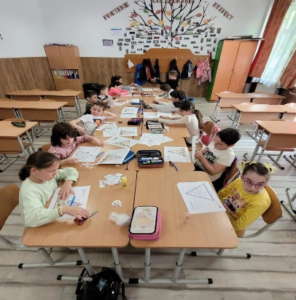News . Best Practices STOP – FOOD WASTE!

This report presents an open schooling initiative about STOP-Food Waste!, which was developed by “Aurel Vlaicu” Theoretical High School, Breaza city between 15.05.2023 and 19.05.2023. Activities included a science professional (school office nurse). It was supported by Valahia University in Targoviste, Romania. This work was previously presented HERE
Care: The students were interested in a real-life issue related to responsible food consumption that represents a conscious food choice, taking into account aspects related to our decisions regarding health, environment, economy, culture, etc. Carrying out social responsibility activities plays an important role in how participants will understand why making any decision about personal food can have negative consequences / irreversible on an important part of our planet. . The students who participated in the activities were students aged 3-18, from preschool, primary, secondary and high school. A total of 825 students participated in these activities.
Know: Students used knowledge about food waste by watching documentaries on the effects of food waste, conducting a case study at economic agents in the city – 3 restaurants, by visiting the bread factory in the city, making leaflets with information through which we can reduce food waste, making a trophic pyramid, healthy breakfast and making figurines of fruits and vegetables, drawing up posters.
The competences that the students practiced were:
- Motivating students to adopt a balanced and economical lifestyle;
- Encouraging students to find practical and effective ways to reduce food waste;
- Developing interdisciplinary connections to draw public attention to food waste;
- Changing the attitude of students, their families, school teachers towards food waste.
Do: At the end, students prepared posters, leaflets, posters, interview, video. They carried out the activities in groups but also individually, being supported by family and community members.
Findings related to the Open Schooling approach: The activity was framed in the curriculum. It was challenging and useful because students’ confidence and self-esteem increased as a result of participating in complex activities that highlighted their abilities and required them to make decisions. The improvement of social skills was reflected through cooperation at the level of working groups and students’ roles in this context, through the relationship with colleagues in school. Open schooling could be challenging for other teachers because it increases creativity levels among both teachers and students.
Results obtained by students: Students were interested in the topic proposed for research and showed interest in participating in other activities aimed at the practical and applicative character of the given topic